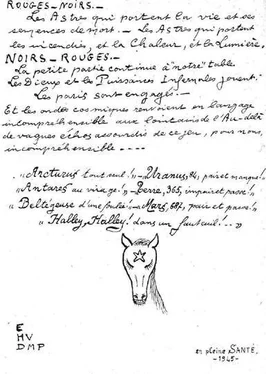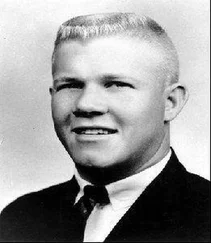“Sometimes.”
“Did he ever give any explanations?”
“Yes, completely valid ones.” She told how he often made purchases at the House Drouot, France’s oldest and most prominent auction house, established in 1852 by Napoleon III and located a few minutes’ walk from the Petiot apartment. Both the auctioneers and the famous black-clad porters with the red collar could well vouch for him. Petiot spent a great deal of time there huddled in a corner like many other dealers, presumably discussing lots and bids.
“What about the many erotic prints that we found?” Massu asked.
“Simple mania of a collector.”
By the end of the visit, the police had uncovered nothing whatsoever to implicate Georgette Petiot in the murders. All they found was a five-carat diamond ring that she could not explain other than say it was a gift from her husband. On this basis, the French police would later charge her with receipt of stolen property. In the meantime, Massu made no charge. He asked her to pack a bag to return to the station. After escorting her through the crowds and into the car, the commissaire was struck by the many curious people who peered in through the window. Georgette shielded her face behind a handkerchief. The driver blew the horn several times to clear a path through the crowds blocking the way.
Georgette Petiot was driven to the Hôtel-Dieu, the oldest hospital in Paris. Located in the shadow of Notre Dame Cathedral on the Île de la Cité, the hospital held the sick and wounded in wings that segregated French and German patients. It also held important witnesses in criminal trials. Here, it was reasoned, Madame Petiot would be able to answer questions, safe from the reporters, photographers, camera crews, crowds, or anyone, for that matter, who might try to avenge a missing person blamed, rightly or wrongly, on her husband. Massu also hoped that, with close surveillance, he might be able to protect this important source of information from a possible suicide attempt.
MARCEL and Georgette Petiot had been married in her hometown of Seignelay on June 4, 1927. Georgette’s father, Nestor Lablais, a former porter of a wagon-lits company, owned a local tavern-inn there, and her mother, Anna Villard Lablais, had been his chambermaid before their marriage. By the time Georgette was fourteen, the family had moved to Paris, and her father purchased the restaurant Côte d’Or in the 7th arrondissement, next to the parliament, the Chambre des Députés. Nicknamed “Long Arm” for his influence with his restaurant patrons, many of whom were prominent politicians, businessmen, and other leading figures of society, Lablais had recognized the talents and potential of his son-in-law.
Other people had also envisioned a bright future for Villeneuve-sur-Yonne’s young mayor. Petiot’s supporters compared him to another French physician-turned-statesman, Georges Clemenceau. One politician at the Petiot wedding, Henri Chéron, told the groom that if he ever had the chance to lead the government, he would appoint him as one of his ministers. Chéron would later serve in several positions, including two stints by 1934 as both minister of justice and minister of finance. By then, however, Petiot’s promising career of the “New Clemenceau” had ended in scandal.
During Petiot’s term as mayor, small items had often disappeared from City Hall. Sometimes it was funds, other times simple trinkets, like a spoon, an ashtray, or a small keepsake that would fit into his pocket. Townspeople soon whispered about the mayor’s peculiar habit. A Villeneuve-sur-Yonne blacksmith, Depond-Clément, remembered Petiot coming to his forge looking for parts to repair his sports car—the mayor drove fast and recklessly, and thus became a frequent visitor there. Petiot would show up, “humming, whistling, and joking,” while also gossiping and showing interest in the workers. Almost every time, afterward, something small, like a tool or a key, would be missing. When a forge employee went to confront him, the mayor simply returned the item, laughing and making no excuses.
Petiot was accused of some other bizarre crimes during his term. One time, the mayor was suspected of stealing a drum. The band for his rival right-wing party had set up the night before a concert at the Salle des Fêtes in the town hall. The next morning, band members arrived to find their bass drum missing. Within days, another band in town, which often played at political functions in support of Petiot’s socialist party, received a new, recently painted drum, the same size instrument as the one that had disappeared. It was a gift from the mayor.
Petiot polarized the town, leading some to praise his achievements, such as his reform of the elementary school system, his modernization of the sewer system, his improvement of garbage collection, and his building of other urban amenities, like a tennis court and a playground. Petiot also gained more railway stops for his town. At one point, he was said to have convinced railway executives of the stops’ necessity by throwing himself from a moving train.
Other people criticized the mayor for his unscrupulous actions, mostly involving corruption and his almost dictatorial control of the city council. Controversy would surround the rest of his term. Funds and property continued to disappear. At least one member of City Hall, Léon Pinau, quit, claiming that he did not want to be engulfed in any of the many scandals likely to ensue in the mayor’s office.
Sure enough, after surviving several lengthy investigations into his accused thefts of oil and gasoline, a small scandal in the summer of 1931 resulted in Petiot’s resignation. A routine audit of his office had found 2,890 francs in fees, from 138 alien-registration applications, that had not been forwarded to the necessary officials. Petiot blamed his secretary for this simple mistake, and the man accepted full blame, pointing to his age, his poor eyesight, and exhaustion as a result of being too long overworked. But in late August, Petiot was suspended. On the twenty-sixth, the day before the suspension took effect, he resigned from office.
Petiot, however, came back in full force, waging another intense, passionate, and controversial campaign for reelection. He told how his experience in war had made him “love the people” and aspire to a career as a physician to improve their well-being. He targeted First World War veterans and workers with appeals to the common man against Parisian decadence and corruption. His opponents returned the criticism: “Drain Petiot out of his graft-built sewers,” as one poster put it.
Petiot’s brazen confidence and unorthodox tactics provided some advantages. At a late-season candidate debate at town hall, he offered to allow his opponent, Henri Guttin, to speak last. Petiot then delivered an enthusiastic address, outlining his many achievements and work on behalf of the poor. When Guttin stepped up to the podium and took out his notes to read his prepared statement, the room suddenly lost power. The candidate fumbled through his speech in the dark, an awkward contrast to the dynamic Petiot. The source of the outage was later traced to the physician’s residence.
In the end, Petiot was defeated. Prepared for the possibility, he had already entered a second campaign for office, this time as general councillor, the rough equivalent of a US congressman. Petiot won this contest, becoming the youngest of thirty-four representatives from Yonne. This position would not last long.
Petiot was again accused of theft, this time in the form of using a combination of cables, plugs, and pins to rewire electricity meters on his house and steal electricity. “It’s a vile political hazing,” Petiot said, blaming the charges on his enemies. The evidence against him, however, was overwhelming. On July 19, 1933, the tribunal at Joigny pronounced him guilty, sentencing him to fifteen days in prison and fining him 300 francs with another 200 in damages. Petiot appealed, and the court waived his prison sentence and reduced the fine to 100 francs, but upheld the verdict.
Читать дальше












